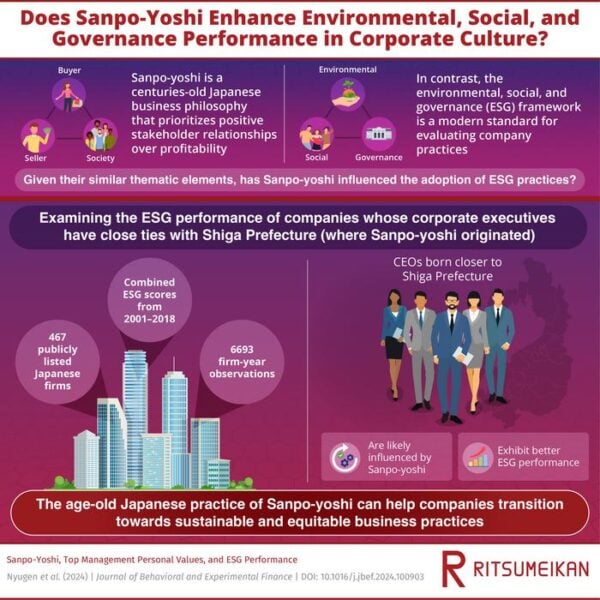A recent study has revealed that the ancient Japanese business philosophy of “Sanpo-yoshi,” which emphasizes the importance of benefiting buyers, sellers, and society at large, has a positive impact on the environmental, social, and governance (ESG) performance of modern Japanese companies. The research, led by Associate Professor Pengda Fan from Ritsumeikan University, Japan, aimed to explore the influence of this centuries-old concept on contemporary corporate practices.
The team analyzed the ESG performance of 467 publicly listed Japanese firms between 2001 and 2018, evaluating their scores in environmental, social, and governance aspects, as well as their ESG controversies. They found that companies with a higher number of directors and CEOs associated with Shiga Prefecture, where the Sanpo-yoshi philosophy originated, exhibited better ESG performances.
“Our research endeavors to not only illuminate the influence of ‘Sanpo-yoshi’ on ESG performance of Japanese firms, but also propagate the richness of Japanese culture on a global scale, akin to the international appreciation of Confucian culture,” explains Dr. Fan.
The researchers hypothesized that individuals in top management positions who were exposed to the concept of Sanpo-yoshi would be more inclined to incorporate these principles into their firm’s decisions and actions, particularly those related to ESG. The findings were further validated using various analyses, which confirmed the positive impact of the Sanpo-yoshi philosophy on ESG scores.
The study also evaluated the impact of factors such as the local political environment, top management’s prosocial attitude, key economic indicators, and female leadership on the correlation between Sanpo-yoshi and a firm’s ESG performance. The results showed that these variables did not affect the primary findings, underlining the significance of the Sanpo-yoshi philosophy in shaping corporate social responsibility.
Dr. Fan emphasizes the potential of their findings, stating, “We introduce a novel stakeholder-centric model that integrates the ethical principles of Sanpo-yoshi into the fabric of corporate governance. Our approach aims to elevate ESG metrics and foster inclusivity, transforming this age-old Japanese philosophy into a universal framework for sustainable and equitable business practices.”
The research suggests that promoting Sanpo-yoshi values can not only improve the ESG performance of Japanese companies but also establish a global standard for responsible business practices.
#SanpoYoshi #ESG #CorporateSocialResponsibility #SustainableBusiness
If our reporting has informed or inspired you, please consider making a donation. Every contribution, no matter the size, empowers us to continue delivering accurate, engaging, and trustworthy science and medical news. Independent journalism requires time, effort, and resources—your support ensures we can keep uncovering the stories that matter most to you.
Join us in making knowledge accessible and impactful. Thank you for standing with us!

